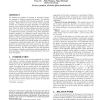Free Online Productivity Tools
i2Speak
i2Symbol
i2OCR
iTex2Img
iWeb2Print
iWeb2Shot
i2Type
iPdf2Split
iPdf2Merge
i2Bopomofo
i2Arabic
i2Style
i2Image
i2PDF
iLatex2Rtf
Sci2ools
100
click to vote
ATAL
2006
Springer
2006
Springer
Learning against multiple opponents
We address the problem of learning in repeated N-player (as opposed to 2-player) general-sum games. We describe an extension to existing criteria focusing explicitly on such settings. While there have been several criteria proposed recently for evaluating learning algorithms in multi-agent systems, most of this work has focused on the two-player setting. Relatively little work has addressed situations in which there are a mixture of several agents using the algorithm in consideration against opponents using other algorithms. Roughly speaking, our proposed criteria require that the agents employing the particular learning algorithm work together to achieve a joint best-response against a target class of opponents, while guaranteeing they each achieve at least their individual security-level payoff against any possible set of opponents outside this target class. We then provide algorithms that provably meet these criteria for two target classes: stationary strategies and adaptive strate...
Related Content
| Added | 20 Aug 2010 |
| Updated | 20 Aug 2010 |
| Type | Conference |
| Year | 2006 |
| Where | ATAL |
| Authors | Thuc Vu, Rob Powers, Yoav Shoham |
Comments (0)

